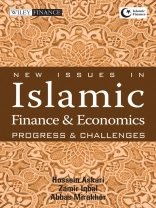Islamic Finance: Progress and Challenges provides a review of the main issues and challenges facing Islamic finance. The application of Islamic finance is currently limited to banking. This book starts with an overview of the factors and motives behind the development of Islamic finance. A critical review of issues facing the industry is provided followed by a detailed analysis of areas where further attention is required. The book offers some original thinking on issues pertaining to governance, institutions, public finance and economic development within an Islamic financial system.
विषयसूची
Glossary of Arabic Terms ix
Acknowledgement xxi
1 Development and Progress of Islamic Finance 1
2 Issues and Challenges 47
3 Islamic Finance and Globalization: Convergence and a
Boost for Rapid Growth? 75
4 Globalization and Its Implications for Muslim Countries111
5 Expanding Financial Frontiers 129
6 Reputational Risk for the Islamic Financial Industry 149
7 Design of Benchmark for Asset Pricing 179
8 Qard-ul-Hassan-based Microfinance 197
9 Developing the Theoretical Foundations of Economics in Islam211
10 Islam and Economic Development 243
11 Taxation and Public Expenditures in Islam 263
12 Scope of Social Safety Net in Islam: A Case Study 293
References 327
Index 363
लेखक के बारे में
PROF. HOSSEIN ASKARI received a B.S. in Civil Engineering, Ph.D. in Economics and attendedthe Sloan School of Management atthe Massachusetts Institute of Technology (MIT). Hewas an instructorof Economics at MIT, Assistant Professor of Economics at Tufts University, Associate Professor of Economics at Wayne State University, Associate Professor and Professor of International Business and Middle Eastern Studies at the University of Texas at Austin and is now the Iran Professor of International Business and Professor of International Affairs at the George Washington University. He served for two and a half years on the Executive Board of the IMF and was Special Advisor to the Minister of Financeof Saudi Arabia. In the mid-1980s he was the director of amultinational team that developed the first energy plan and energyplanning models for Saudi Arabia. He has written extensively oneconomic development in the Middle East, international trade andfinance, agricultural economics, oil economics, and on economicsanctions. He has been an advisor to a number ofgovernments, institutions and corporations.
DR. ZAMIR IQBAL works as Lead Investment Officer with the Quantitative Strategies, Risk and Analytics department in the Treasury of the World Bank in Washington, D.C. He earned his Ph.D.in international finance from the George Washington University, where he also serves as adjunct faculty of international finance.He has published several articles on Islamic finance in journals ofrepute and has presented papers at international forums. He hasextensive experience with capital markets, structured products, risk management, financial sector development, and financialmodeling.His research interests include Islamic Finance, Financial Engineering, Structured Finance and International Banking. He isco-author of Introduction to Islamic Finance: Theory and Practice (2007) and Risk Analysis for Islamic Banks(2007).
DR. ABBAS MIRAKHOR, born in Tehran, Islamic Republic of Iran, attended Kansas State University, where he received his Ph.D. in economics in 1969. From 1969 to 1984, he taught in variousuniversities in the U.S. and Iran. From1984 until 1990, he servedon the staff of thief, and from 1990 to 2008, he served as the Executive Director for Afghanistan, Algeria, Ghana, Islamic Republic of Iran, Morocco, Pakistan, and Tunisia on the Executive Board of the IMF. Dr. Mirakhor is the co-author of Essays on Iqtisad: Islamic Approach to Economic Problems (1989), Theoretical Studies in Islamic Banking and Finance (1987), and Introduction to Islamic Finance: Theory and Practice(2007). He has received several awards including ‘Order of Companion of Volta’ for service to Ghana, conferred by the President of Ghana in 2005; Islamic Development Bank Annual Prizefor Research in Islamic Economics, shared with Mushin Khan in2003, and ‘Quaid-e Azam’ star for service to Pakistan, conferred by the President of Pakistan in 1997.












